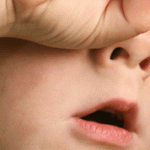Breathing Problems in Infants
 Breathing is vital for the body to function properly. Respiratory muscles are involved in inhaling process. Inhaled air is rich in oxygen which is needed by the body to function properly. Then inhaled oxygen get transferred from lungs to the bloodstream and exchanged with carbon dioxide that is breathed out. The more oxygen can be inhaled by breathing faster. The brain, the heart, lungs and respiratory muscles must all function properly to keep breathing normally. A problem in these systems can create difficulties for the body to work properly.
Breathing is vital for the body to function properly. Respiratory muscles are involved in inhaling process. Inhaled air is rich in oxygen which is needed by the body to function properly. Then inhaled oxygen get transferred from lungs to the bloodstream and exchanged with carbon dioxide that is breathed out. The more oxygen can be inhaled by breathing faster. The brain, the heart, lungs and respiratory muscles must all function properly to keep breathing normally. A problem in these systems can create difficulties for the body to work properly.
Main causes of breathing problems in infants
Breathing difficulties may occur if the brain‘s respiratory center is not working properly. The trauma to the brain, increased pressure in the brain, some drugs like narcotics, problems in the chemical balances in the blood can create breathing problems.
Heart may have problems in pumping blood to the lungs or the body and the body may not get sufficient blood with oxygen which can cause problem in breathing.
Lungs must function well to receive blood and get oxygenated but the difficulties in the lungs will not transfer the oxygen. The infection or fluid in the lungs and cystic fibrosis can affect the functioning of the lungs to cause difficulties in breathing. Dry drowning symptoms also create problems in breathing in kids.
Weak respiratory muscles which help in breathing will create problems in breathing. Some medication can cause muscle paralysis, the damage to the nerves that is connected with these muscles and the neurological diseases can pose the difficulty for breathing.
Blockage in the airway can restrict the air from absorbing into the lungs. The infections, foreign bodies and some congenital abnormalities of the air can create problems in breathing.
Bronchitis, asthma, flu, apnea of prematurity, sleep apnea are the main diseases among small children or infants which shows following symptoms.
Symptoms of breathing difficulties
1. Due to nasal congestion, runny nose, scratchy throat and cough which may go up the fourteen days and infant breaths with mouth open.
2. Fever may be experienced up hundred one to hundred two degree Celsius.
3. Appetite get decreased.
4. Lethargy and general feeling of illness.
5. Headaches and body pain may develop with influenza, child start breathing through mouth.
6. Cranky and uncomfortable appearance can be seen amongst infants, who are unable to communicate properly.
7. Infants may get gagged or choked because of the mucous they are unable to spit out.
8. Inflammation and mucus can make the child to breathe rapidly and high pitched noise can be heard while breathing out.
9. Narrowing of the air ways can cause to gasp for breath and turn blue.
10. Middle ear infection may develop along with viral respiratory attack can create more problems.
Treatment
Mild upper respiratory infections don’t require treatment unless there is trouble in breathing. Antibiotics are not given to cure respiratory tract infections and only rest can maintain normal fluid intake. Anti-inflammatory drugs may be given in case of fever or pain. The drugs can congest to cause agitation, hallucination, lethargy and rapid heart rate Rubber suction bulb may be used to relieve congestion.
Preventions
- Teach good hygiene habits to children
- Habit of washing hands frequently children is good
- Avoid, schooling and contact with other children
- All vaccination to infants at right age are must
- Keep infants and toddlers protected from air pollutions
- Public places are more susceptible for infections, so try to be more cautious about infants